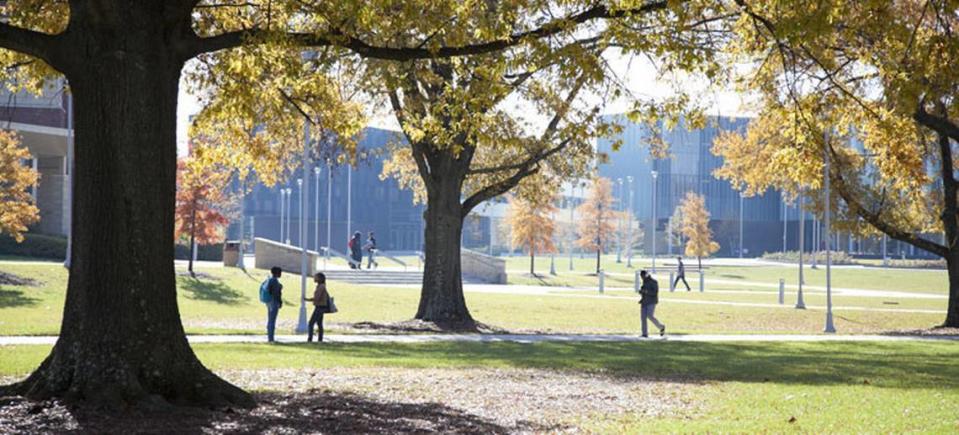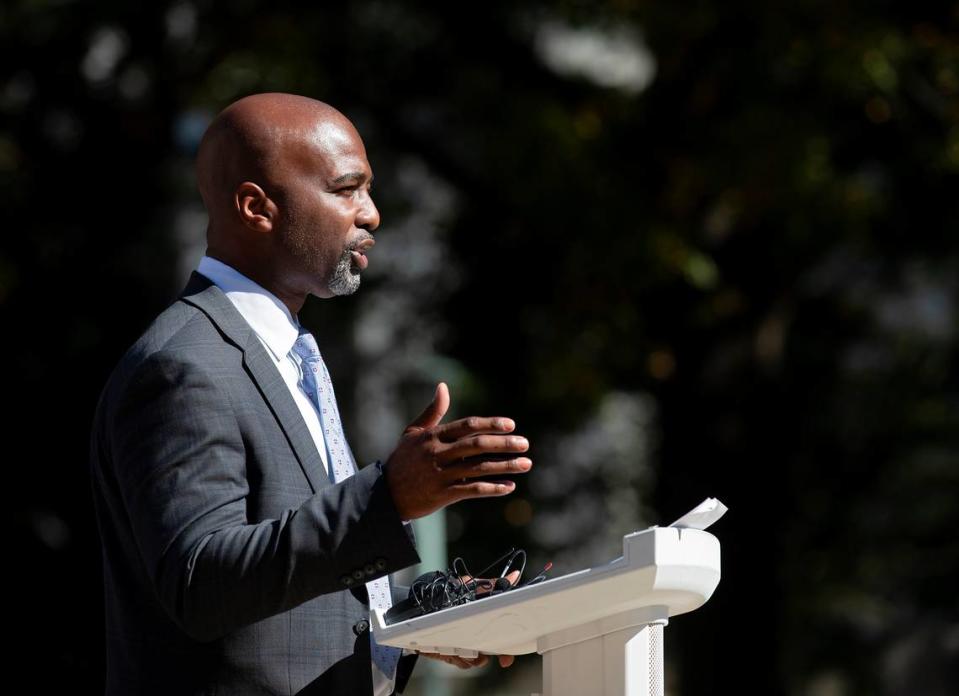NC faces pressure to ‘rectify the wrongs’ of inequitable HBCU funding or risk litigation
- Oops!Something went wrong.Please try again later.
North Carolina has been too slow to address years of underfunding of its historically Black colleges and universities, and needs to commit to meaningfully fixing the issue or can expect litigation, a group of attorneys are telling state leaders.
The attorneys, whose clients are students and alumni of the state’s public HBCUs, sent a letter to Gov. Roy Cooper last week, calling on him to initiate a review of the process by which the state spends money on HBCUs and other universities, to identify any disparities, and commit to calling for necessary additional funding to close the gaps.
In the Oct. 24 letter, the attorneys wrote to Cooper that “the continuation of these disparities is not only morally reprehensible but also legally untenable,” and said that if he didn’t respond to their concerns within 10 days, they would “pursue legal action as appropriate” in federal court.
The pressure from the attorneys comes after the Biden administration wrote to Cooper and 15 other governors in September, noting sizable “unacceptable funding inequities” at land-grant HBCUs across the country, and urging them to take action to try to bridge the gap in funding between HBCUs and other universities.
In that letter, U.S. Secretary of Education Miguel Cardona and U.S. Secretary of Agriculture Tom Vilsack wrote to Cooper that the underfunding issue “clearly predates all of us,” but said it was a problem they hoped to collaborate on “to avoid burdensome and costly litigation that has occurred in several states.”
During a press conference Wednesday, Carlos Moore, an attorney with the Cochran Firm in Mississippi, said that he and other attorneys “would love to avoid taxpayers paying for expensive litigation,” but said it was up to Cooper to respond to the concerns they laid out in their letter.
“The writing is on the wall, the evidence is there; it’s abundantly clear that the HBCUs in this state have been funded inequitably,” Moore said.

State Rep. Zack Hawkins, a Durham Democrat, said during the press conference that additional funds for the state’s HBCUs could go towards improving not just campus infrastructure, but also research and development programs and student support services.
Hawkins said it was time for the state to “rectify the wrongs of the past” and “ensure that we have the opportunity to build the diverse workforce which all of our companies are asking for.”
Biden administration compares NC A&T, NC State in letter to Cooper
In their letter to Cooper, Cardona and Vilsack highlighted North Carolina A&T State University, the historically Black land-grant university that was founded in 1891, and its disparities in funding as compared to NC State University, the state’s first land-grant university.
Cardona and Vilsack estimated, using federal data, that NC A&T had been underfunded over the past 30 years by more than $2 billion compared to NC State.
Such underfunding “disadvantages the students, faculty, and community that the institution serves” and “may contribute to a lack of economic activity that would ultimately benefit North Carolina,” the letter stated.
NC A&T, like the other HBCUs highlighted in the letters, was founded as part of the Morrill Act of 1890, the federal act to establish land-grant institutions for Black and minority students. The first Morrill Act, enacted in 1862, was responsible for the founding of dozens of public universities, including NC State, but those institutions generally discriminated against Black students at their origin.

The second Morrill Act required states to “provide an equitable distribution of funds between their 1862 and 1890 land-grant institutions,” but that hasn’t happened in North Carolina — nor in 15 of the 17 other states with land-grant HBCUs — the letter stated.
“North Carolina A&T State University, the 1890 land-grant institution in your state, while producing extraordinary graduates that contribute greatly to the state’s economy and the fabric of our nation, has not been able to advance in ways that are on par with North Carolina State University at Raleigh, the original Morrill Act of 1862 land-grant institution in your state, in large part due to unbalanced funding,” Cardona and Vilsack’s letter to Cooper stated.
The letter suggested North Carolina leaders remedy the disparity either “over the course of several years in the state budget” or by combining a “substantial state allocation” to decrease the deficit in funding with “a forward-looking budget commitment” that would provide a two-to-one match in dollars between the second and first Morrill Act schools, respectively.
It did not recommend cutting funding to other universities to remedy the disparity.
What is an HBCU? A look at North Carolina’s historic Black colleges & universities
Cooper calls on lawmakers to act in response
Replying to Cardona and Vilsack’s letter in late September, Cooper wrote that North Carolina is proud to be home to the most four-year HBCUs of any state in the country, and said he applauded the Biden administration’s efforts to “shine a light on a shameful historical inequity.”
Cooper said that in his time as governor, he had advocated for increased funding for HBCUs, and noted that it was the constitutional duty of the General Assembly to fund the state’s public university system.
He also cited a specific budget item calling for $20 million in recurring funding for NC A&T, to help the HBCU expand its research programs and research faculty capacity — which was included in the state budget that GOP lawmakers approved and that became law in early October.
“I recognize that these efforts need to be part of a broader and more robust mission to solve more than a century of chronic underfunding and we must do more,” Cooper wrote.
He added that he had directed his Office of State Budget and Management and policy staff to examine the data the Biden administration had presented in its letter, “and work toward solutions to share with the General Assembly.”
Sam Chan, a Cooper spokesperson, told The News & Observer that Cooper appreciates the Biden administration’s work to quantify and address the issue of historical underfunding.
“Our office has heard from individuals and groups who share this concern and will continue to engage them and urge legislators and others to take action to fully fund these vital institutions,” Chan said.
Can funding be addressed in the short session?
During the press conference last week, Hawkins acknowledged that the General Assembly is “exactly where the conversation has to go next,” since GOP lawmakers ultimately decide what will be in the budget, particularly now that they control a supermajority in both chambers and can override Cooper’s vetoes.
With this year’s long session having just wrapped up this past week, Hawkins said that lawmakers could look at the short session that’s scheduled to begin in late April, and future budgets, to address underfunding of NC A&T and other HBCUs.

Still, Moore said, the governor proposes his own budget before the House and Senate put forward their proposals, and that is an opportunity for Cooper to “show real leadership and encourage the legislature to do the right thing.”
Referring to the $20 million allocation for research programs and faculty Cooper mentioned in his letter to the Biden administration, Moore said that amount “is just a drop in the bucket of what’s needed.”
“It’s a start, but it’s way far beyond what we need,” Moore said.
Asked if Republicans would be open to more funding to bridge the gap HBCUs have faced in the short session or later, Senate leader Phil Berger stopped short of discussing any plans for future funding but said that Republicans have increased funding “just about every session” since they took control in 2011.
“I think it’s about time Democrats acknowledged that for the entire time that they controlled the entirety of state government, that they woefully underfunded the HBCUs, to the point where, when we got the majority, you had one that was about to close,” Berger said, referring to Elizabeth City State University.
Lawmakers spent historically large amounts on ECSU in the 2021 budget, about $140 million, The N&O reported. They spent more than $164 million on Fayetteville State University in the same plan.
As for NC A&T, Berger said historically it has been “shortchanged in many respects, with reference to a lot of the money that should have gone, and should go, and I would say that the General Assembly over the past decade has done more to try to catch up and address those issues, than was done in the previous 50 years.”
Lauren Horsch, a spokesperson for Berger, said in an email that since 2011, NC A&T has received more than $1 billion in funding from the state. The net appropriation allocated to the university in this year’s budget, $156.4 million, is nearly 70% greater than the $92.6 million lawmakers set aside in the 2020-21 base budget, Horsch said.
She also pointed to other ways the legislature has tried to help HBCUs, including NC Promise, which provides discounted tuition for four colleges, including ECSU and Fayetteville State; and the Cheatham-White Scholarship, a merit-based scholarship for students at NC A&T and North Carolina Central University, which covers tuition and associated costs like student fees, housing, meals, and textbooks.
“N.C. A&T is an integral part of our state, and we want to continue to see it grow and flourish,” Horsch said.

